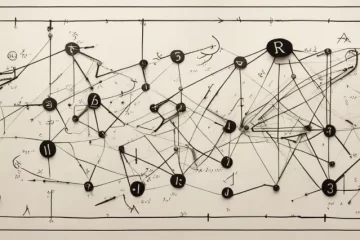The Art of Relationship Building: Unlocking Secrets from’Never Split the Difference’

In today’s fast-paced world, navigating relationships has become an intricate dance that requires finesse and effective communication. Whether it’s personal relationships or business partnerships, understanding the art of negotiating can make all the difference between success and failure. In their insightful book, “Never Split the Difference,” written by renowned negotiation expert Chris Voss and journalist Tahl Raz, readers are taken on a journey that goes beyond traditional negotiation tactics and delves into the dynamic realm of human psychology. With captivating anecdotes and practical strategies, Voss and Raz shed light on how mastering the art of negotiation can transform relationships, helping individuals forge deeper connections and achieve greater mutual understanding. If you’ve ever wondered how a few simple techniques can revolutionize your approach to relationships, this article is your gateway to discovering the secrets hidden within the pages of “Never Split the Difference.
What is Relationship
A relationship is the way two or more people or things are connected, or the way they behave toward each other. It can refer to personal connections between individuals, such as friendships, romantic partnerships, or familial ties. It can also refer to the interactions and dynamics between individuals or groups, such as professional relationships in the workplace or international relations between countries. Relationships can vary in nature and intensity, and they can be positive, negative, or neutral. Building and maintaining healthy relationships is important for personal happiness, social support, and overall well-being.
Why is Relationship Important to Us
Relationships are important to us for several reasons:
1. Emotional support: Good relationships provide us with emotional support during both good and bad times. Having someone who understands and empathizes with us can help alleviate emotional stress and provide comfort when needed.
2. Sense of belonging: Relationships give us a sense of belonging and connectedness to others. They help us feel part of a larger community and give us a sense of identity and purpose.
3. Socialization and companionship: Relationships provide opportunities for socialization and companionship. They allow us to engage in shared activities, have conversations, and spend quality time with others. The presence of supportive and caring relationships can enhance our overall well-being.
4. Personal growth and self-awareness: Healthy relationships provide opportunities for personal growth and self-awareness. Interacting with others allows us to gain insights into our own strengths and weaknesses, learn from different perspectives, and develop new skills for communication and conflict resolution.
5. Physical health benefits: Research has shown that having strong, positive relationships can have a positive impact on our physical health. Good relationships have been linked to lower rates of chronic diseases, reduced stress levels, and increased longevity.
6. Motivation and goal achievement: Relationships can provide motivation and support for achieving personal and professional goals. Having someone who believes in us and encourages us can boost our self-confidence and drive to strive for success.
Overall, relationships are important because they bring joy, love, support, and a sense of belonging into our lives. They play a critical role in our well-being and happiness, contributing to our overall quality of life.
Unlocking Relationship from Never Split the Difference

Never Split the Difference Introduction
“Never Split the Difference” is a book written by former FBI hostage negotiator, Chris Voss, along with journalist Tahl Raz. The book explores the art of negotiation and provides practical strategies to negotiate effectively in both personal and professional settings.
The authors emphasize the importance of understanding empathy, emotions, and active listening to achieve successful negotiations. They present various techniques and principles that can be utilized to build rapport, create trust, and influence others. Some of these techniques include mirroring, labeling emotions, and using calibrated questions.
Voss shares real-life hostage negotiation experiences and reveals how these high-stakes situations can offer valuable lessons for negotiating in everyday situations. He emphasizes the significance of emotional intelligence and highlights the power of “tactical empathy” – understanding the emotions and needs of the other party to influence their decisions effectively.
The book challenges traditional negotiation methods and promotes unconventional strategies that focus on finding creative solutions and incorporating fairness and collaboration. It also emphasizes the importance of preparation, including analyzing the counterpart’s perspective and imagining potential scenarios.
Through engaging anecdotes and easy-to-understand explanations, “Never Split the Difference” offers readers valuable insights into negotiation techniques that can be applied in various contexts, such as business deals, salary negotiations, and even personal relationships. The book equips readers with practical skills to overcome obstacles, handle tough conversations, and achieve better outcomes in negotiations.
Bulding Relationship Methods
In the book “Never Split the Difference” by Chris Voss and Tahl Raz, the authors discuss various relationship-building methods that can be used in negotiations and everyday interactions. Here are some of the key methods mentioned in the book:
1. Establish rapport: Building rapport is important to create a positive and trusting relationship. This can be done by showing genuine interest in the other person, mirroring their body language and tone of voice, and finding common ground.
2. Active listening: Listening actively involves not only hearing the words being said, but also paying attention to the speaker’s tone, emotions, and non-verbal cues. Responding with empathy and asking open-ended questions can encourage the speaker to share more and build a stronger connection.
3. Labeling emotions: Identifying and labeling the emotions the other person is experiencing can demonstrate understanding and help defuse potential conflicts. This involves acknowledging their concerns or frustrations and validating their feelings.
4. Tactical empathy: Tactical empathy refers to understanding the other person’s perspective and emotions while also advocating for your own interests. It involves actively listening, summarizing their feelings, and using calibrated questions and statements to gather information and influence their behavior.
5. Mirroring: Mirroring is a technique where you subtly imitate the other person’s body language, speech patterns, and gestures. This can help establish a connection and build trust, as it subconsciously signals similarity and understanding.
6. Calibrated questions: Calibrated questions are strategic questions that cannot be answered with a simple “yes” or “no.” They are designed to encourage the other person to share more information and provide insight into their perspective and motivations.
7. Find the “That’s right” moment: Instead of aiming for a “yes” from the other person, the goal is to reach a “that’s right” moment where they fully understand and acknowledge your perspective. This can be achieved by actively listening, summarizing their points, and then gradually introducing your own ideas or solutions.
These are just a few of the relationship methods discussed in “Never Split the Difference.” The book provides many more insights and tactics for effective negotiation, communication, and relationship-building.
Never Split the Difference Quotes
Never Split the Difference quotes as follows:
1. “No confrontation should start until you know that you’ve been heard.”
2. “Tactical empathy is understanding the feelings and mindset of your counterpart to have influence in your discussions.”
3. “The single most dangerous negotiation mistake is approaching it as a battle.”
4. “Negotiation isn’t an act of battle; it’s a process of discovery.”
5. “Never be so sure of what you want that you wouldn’t take something better.”
6. “The key to gaining the upper hand in a negotiation is giving the other side the illusion of control.”
7. “The strongest position isn’t always the most powerful one; it’s the one that most resonates with the other side.”
8. “Words alone don’t create trust; it’s how they’re delivered.”
9. “Good negotiation is not about beating the other side; it’s about finding a win-win solution.”
10. “When the other side seems irrational, often there is an unexpressed emotion driving their behavior.”

More Books About Never Split the Difference by Chris Voss, Tahl Raz
1. The Introverted Leader” by Jennifer B. Kahnweiler:
In “Never Split the Difference,” Chris Voss emphasizes the importance of active listening and understanding the motivations and needs of others. The Introverted Leader” by Jennifer B. Kahnweiler complements this idea by exploring the strengths of introverted leaders in building effective relationships and communication. With practical tips and personal stories, Kahnweiler provides valuable insights on leveraging introverted qualities to lead and negotiate successfully.
2. What Happened to You?” by Bruce D. Perry:
Chris Voss emphasizes the significance of empathy and understanding others’ perspectives. What Happened to You?” by Bruce D. Perry delves further into the power of empathy by discussing trauma, its impact on individuals, and how understanding someone’s past can transform relationships and negotiations. This book offers a compassionate approach to understanding others and building better connections based on empathy.
3. The Power of Moments” by Chip Heath, Dan Heath:
One of the essential lessons from “Never Split the Difference” is the importance of creating memorable experiences for positive outcomes. The Power of Moments” by Chip Heath and Dan Heath further explores this notion, diving into the psychology behind extraordinary moments and how they can shape our lives. By understanding how to craft impactful moments, readers can apply these principles to negotiations, leadership, and personal relationships.
4. Influence: The Psychology of Persuasion” by Robert Cialdini:
While not directly referenced in “Never Split the Difference,” “Influence” by Robert Cialdini offers valuable insights into the psychology of persuasion. Voss’s negotiation tactics focus on understanding the motivations and influencing factors of others, and Cialdini’s book offers a comprehensive framework for understanding and harnessing persuasive techniques ethically. This is a recommended read for anyone interested in enhancing their negotiation and leadership skills.
5. Crucial Conversations: Tools for Talking When Stakes Are High” by Kerry Patterson, Joseph Grenny, Ron McMillan, Al Switzler:
Whether negotiating or leading, having difficult conversations is often inevitable. “Crucial Conversations” provides practical tools and strategies for handling tough discussions successfully. This book aligns with the principles outlined in “Never Split the Difference” by emphasizing the importance of open dialogue, effective communication, and maintaining relationships during high-stakes conversations. It offers readers a valuable toolkit to navigate challenging negotiations and interactions.



2 Comments
Discover the Secrets of Influence through "The Art of Seduction" by Robert Greene - singleread.com · 01/19/2024 at 16:46
[…] “Never Split the Difference” by Chris Voss is an excellent recommendation for anyone interested in mastering the art of […]
Secrets of Power Negotiating: Elevate Your Negotiation Skills Effectively - singleread.com · 01/31/2024 at 00:05
[…] In business dealings: Negotiation is a fundamental aspect of business transactions, whether it is negotiating contracts, partnerships, sales, or acquisitions. Strong negotiation skills can help individuals […]